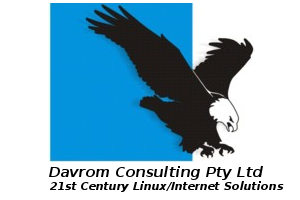





Back to Newsletters DAVROM CONSULTING Newsletter - Issue # 08 - Dated: Sun Mar 17 20:47:54 EST 2002 From the desk of David Clark Back in my Q_unix/Release4 days we used to find that similar support issues seem to come around at the same time. For us this last month it seems to be the "death of the tape drives" on SCO systems syndrome as well as some modem issues on HP-UX. I have noticed this phenomenon for years in the support industry and it hasn't changed. In this issue we cover the new Caldera Messaging Server and connecting up your SCO OpenServer/Unixware server as an Internet Gateway. I would like to thank the reader for their time in reading this newsletter. David.M.Clark Caldera Volution Messaging Server For those of you who could not attend the recent Caldera seminars on Volution Messaging Server, I have quickly covered some details on this awesome product. With Caldera Volution Messaging Server we finally have a Linux product that directly interfaces completely with MS Outlook clients including features such as caldendaring which in the past UNIX e-mail server engines could not provide. Volution Messaging Server supports MS and non-MS e-mail clients such as MS Outlook, Eudora, Netscape, Kmail, IMP - basically any e-mail client should work as they all use standard POP and IMAP protocols. Essentially you can put Volution Messaging Server right into a legacy Windows MS Outlook network and provide a feature for feature robust solution with the added "uptime strength" of UNIX/Linux and at a much lower cost. Volution Message Server provides you with a fully functional web interface (ie managed by your favourite browser) and users in the e-mail system exist independent of the Linux OS itself. One nice part of the current licencing is that you can test drive the product with the 60 day eval before committing to buy. DAVROM CONSULTING sees the future of this product as one of its major supported platforms so if you are interested in looking at this awesome solution, please contact us. For more information on the product you can go to: http://www.caldera.com/products/messaging SCO as your Internet Gateway A few sites out there are using Windows PC's to connect to the Internet to retrieve e-mail and surf the "net" - these require their own modem and can only be used by one single user at a time. If you are running this type of connection, why not consider using your SCO server as an Internet Gateway. Your existing SCO server is capable of acting as your Internet gateway for your network instead of your local PC's dialing up with their own modem. You use the same dialup connection from SCO as you would your Windows PC (ISP username and password) and the SCO server is assigned a dynamic IP address each time it connects - this helps with security as well in that you are not running as a set IP address all the time and most ISP's disconnect you after four hours, and you get a new IP when SCO re-connects automatically. If you do get a permanent IP address then you can turn your SCO server into your e-mail and webserver as well. All that is required for SCO OpenServer server is to be setup with PPP (MorningStar PPP is preferred) which comes bundled with SCO OpenServer. For Unixware7 (now Caldera Open UNIX 8) PPP dialout is an integrated part of the Network Manager. For OpenServer you need the "ipf" supplement to turn your server into a gateway with network translation (and firewall rules if required). A few customers are now running this type of solution and it works well. The local PC's in the network simply point to the SCO server as their gateway and SCO handles the rest. DAVROM provides a script that allows you to login and take the Internet connection up or down as the case may and even perform some diagnostics on your connection. Please feel free to contact us to discuss implementing this for your site. Tech Tip Here is a quick procedure on ftp-ing a tar archive file up to a remote server and using the automated feature of the $HOME/.netrc file. Say we want to automatically upload a file called "portal.tar.gz" to a remote server called "mail.dynamite.org". Firstly we place an entry in the ".netrc" file in our $HOME directory with an entry containing the login name and password for the remote server: machine mail.dynamite.org login mydymite password expl0de next we need to make the ".netrc" file read-only by the owner with the command: chmod 600 .netrc Now we build a shell script called "dynamiteportal" using your favourite UNIX text editor such as "vi", "vim" or "pico". The contents of the script would be: ftp mail.dynamite.org << eof verbose prompt no binary put portal.tar.gz bye eof Now make the script executable with "chmod 755 dynamtieportal". Now run the script. It will copy the file up to the remote server with no human intervention required. Back to Newsletters 





Website design by Davrom Consulting Pty Ltd This site is fully tested with Google Chrome and Firefox web bowsers Home Page | Support | Misc | David's Pages | Podcasts | Contact Us | Blog |
